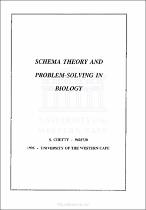| dc.description.abstract | There is ongoing research to understand why some students experience difficulty in solving problems. There is an equal concern over students that do arrive at correct solutions to problems, but who are unable to justify their answers. This has led to an important conclusion that "correct answers do not necessarily measure students' understanding in science". It is against this background that this mini-thesis reports the findings from a study that examined biology problem-solving in the light of the schema theory. The study focused primarily on the influence of cognitive structures called schemata, on biology problem-solving. The collection of data centered mainly around the influence of, and the relationship between, the conceptual and procedural knowledge required in problem-solving. This was done within the context of identifying expert-novice differences. Some of the secondary aims of this study included the influence of text-book use and problem-representation, on problem-solving performance. Based on the concepts and procedures used by expert problem-solvers in this research, a small-scale intervention program was designed, to explicitly teach this knowledge and strategies to novices, so as to improve their problem-solving performance. Both quantitative and qualitative data were collected, by questionnaire and personal interview, respectively. Using the clinical interview technique, an interview protocol was obtained for each of six standard nine students in a secondary school, as they attempted three problems on genetics. In addition, another 70 standard nine students of the same school were asked to complete a questionnaire, after they engaged in the same problem-solving exercise that was presented to the students during the interview. The study revealed that expert problem-solvers have, not only greater domain-specific knowledge than the novices, but that this knowledge is better organized to aid retrieval and application. Furthermore, the novices lacked the repertoire of problem-solving strategies that characterized the experts. The intervention program, although attempted on a small scale, proved successful in transforming novice problem-solving behaviors towards that of an expert. With increased practice, greater efficiency could be achieved. Based on the above, and the direct influence that text-book use and problem representation was found to have on problem-solving, a number of pedagogical implications were elaborated. | en_US |

